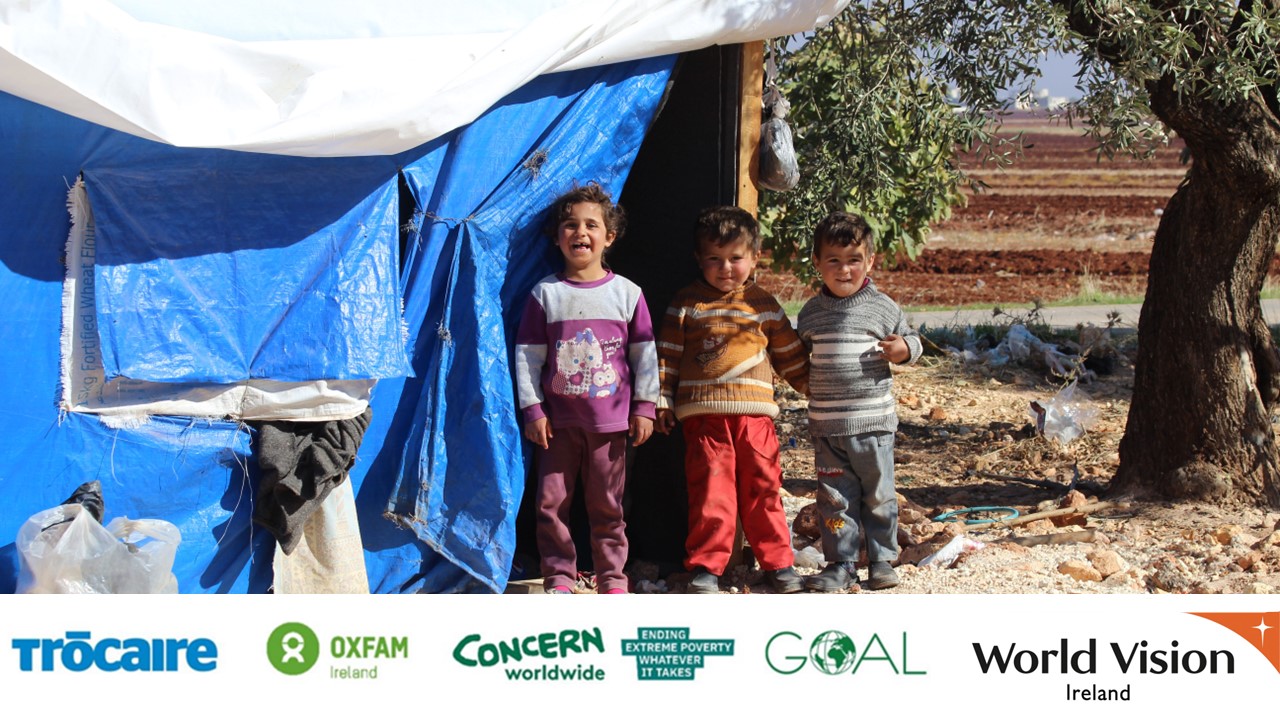- 3 min read
- Published: 5th July 2022
Irish humanitarian aid agencies appeal to UN Security Council
to keep vital Syria – Türkiye (Turkey) border crossing open

Five Irish aid agencies (Trocaire, Oxfam Ireland, Concern, GOAL and World Vision Ireland) today called on the UN Security Council to vote to keep a vital border crossing between Syria and Türkiye (Turkey) open to allow for lifesaving aid to reach millions in need.
The agencies say the July 7th vote on the border crossing is critical for the lives and well-being of 4.1 million people trapped in northwest Syria, where humanitarian needs are at their highest since the conflict started 11 years ago.
Millions of Syrians are completely dependent on humanitarian aid to survive, especially those who have been displaced by the conflict. 80% of those in need are women and children and over 3.2 million people are food insecure and need food assistance.
The UN Security Council, of which Ireland is currently a member, established a cross-border resolution in 2014 which allowed for four crossings for humanitarian aid delivery. Since 2020, this has been whittled down to one crossing which allows humanitarian aid to reach Syrians in need.
Speaking on behalf of the five aid agencies, Mary Van Lieshout, Director of External Affairs, GOAL, said: “The priority must be the delivery of humanitarian aid to families who need it in the most direct and efficient way. Bab al-Hawa is now the sole border crossing point for humanitarian operations into Idleb and Aleppo in northwest Syria and it must be protected.
“If humanitarian organisations are unable to operate cross-border when humanitarian needs are rising rapidly there will be a disastrous deterioration in living conditions.
“We urge the UN Security Council to renew Resolution 2585 on cross-border aid to northwest Syria. Failure to renew the resolution will immediately disrupt lifesaving aid operations, plunging people in northwest Syria into even more appalling misery, threatening access to food, medical care, and shelter. This is a humanitarian and moral imperative,” continued Mary Van Lieshout.
Since the resolution came into effect in 2014, millions of Syrians have benefitted from UN-led cross-border assistance despite continued insecurity, conflict, and access constraints. In 2021, the cross-border humanitarian response enabled aid agencies to reach over 2.4 million people per month in the northwest. This provided food for 1.8 million people, nutrition assistance for 85,000 people, education support for 78,000 children, access to life-saving dignity kits for 250,000 women and girls and critical medical items and supplies to help people survive the cold winter months.
For further information, please see https://www.un.org/press/en/2022/sc14954.doc.htm
To organise an interview, please contact Jane Curtin, Comms Manager, GOAL. Tel.: 087 938 0779
ENDS
Notes to Editor:
Humanitarian needs in northwest Syria
- In northwest Syria, 4.1 million people are in need of humanitarian assistance, which represents an increase from 3.4 million in 2021.
- This population remains in areas that can only be reached with lifesaving assistance that is delivered cross-border.
- 2.8 million of the Syrian population residing in the northwest are IDPs, and 1.7 million of them live in camps or informal settlements.
- People living in camps often lack adequate shelter, infrastructure, protection, and basic services including water, sanitation, and healthcare.
- Over 70% of the population are food insecure in northwest Syria (3.1 million out of 4.4 million people)
- In northwest Syria, people are particularly impacted by the crisis in Ukraine because they are largely dependent on humanitarian food aid and imports from Turkey. Turkey imports 78% of its wheat from Ukraine and Russia so any potential price increases or wheat shortages in Turkey are likely to affect Syria’s northwest.
- The price of essential food items in northwest Syria has already increased up to 22% and 67% (varies by region) since the start of the conflict in Ukraine.
Humanitarian needs across Syria
- 14.6 million people require help to meet their basic survival needs.
- Over 12 million people are still acutely food insecure.
- Up to 80% of those internally displaced are women and girls.
- Over half of those in camps across Syria are under the age of 18 years.
- 2021 saw the worst drought in 70 years, affecting access to drinking water, electricity generation and irrigation water for millions of Syrians.
- The water crisis crippled the harvest in 2021, which is likely to exacerbate food security throughout 2022 and beyond.
- Price increases on essentials including food, water, and transportation means that Syrians are not able to afford the basics they need and there are little or no adequate public services to support them.
